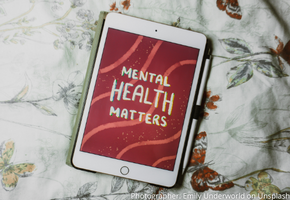Decoding mental health
Anxiety, bullying, divorce, or stress can affect our mental health. What are the symptoms of poor mental health? When is it time to seek professional help? What can a counsellor do to help? We get answers from EMCC counsellors.
Why is good mental health important?
When we are in good physical health, all the parts of our body function as they should. The same applies to mental health.
When we are in good mental health, we are able to function as we should. We can carry out our care-taking duties, go to work, do our school assignments, eat properly, sleep well and meet our social commitments.
Good mental health complements good physical health and makes it possible for us to live life optimally.
What affects our mental health and what are symptoms of poor mental health?
We can be knocked off our mental equilibrium when certain things happen in our lives. Such as when someone close to us dies, or we lose a job, or when we discover an infidelity in our marriage.
Sometimes, it’s not a one-off event, but something that has been happening over a period of time and continues to cause you anxiety and stress each time. An example of this is bullying, which can happen at home, at school or at work.
Depending on the nature of the event and the psychological resilience we have built up, we may be able to manage these emotions and carry on with our lives, as per normal. Other times, the blow may be too much to bear and we may be knocked off our stride.
When this occurs, we could find it difficult to carry out our day-to-day functions.
For instance, we may dread going to school or work, or meeting friends. We may find it hard to fall and stay asleep, or to concentrate on our tasks. We lose our appetite to eat. Just getting out of bed every morning may become almost insurmountable.
These are all symptoms of our mental health deteriorating.
This is when seeing a counsellor will help. Seeking professional support early will help prevent the symptoms from getting worse.
How can a counsellor help? What does a counsellor do?
A trained counsellor could:
• Challenge a client’s thinking patterns that may be keeping him in a negative frame of mind
• Problem-solve with a client to make better choices for herself
• Attend to a client’s grief arising from a loss (through break-up, retrenchment, divorce, etc)
• Process trauma with a client (such as from a sudden death, or domestic abuse or neglect)
• Provide a client with strategies to cope with stress and anxiety
• Facilitate conversations to help a couple resolve a conflict
• Facilitate a family session to allow each member to be heard, understood and connected amidst differences
• Facilitate a Play Therapy session to allow a child/youth to express unspoken pain/hurt/concern that is stressing the child/youth
EMCC counsellors are highly trained and have a range of approaches in their toolbox that they draw from and apply. Each intervention is carefully chosen to best meet the specific needs of each client.
Is poor mental health the same thing as mental illness?
No, poor mental health is not the same as mental illness.
A person’s mental health can be poor but this does not necessarily mean he/she is sick with a mental illness.
For example, a person can be anxious whenever he/she faces stressful situations but that does not mean he/she is suffering from Generalised Anxiety Disorder (GAD).
However, because of the unfortunate stigma that is still attached to the term “mental illness” in some societies, the term “mental health condition” is sometimes used instead.
Mental illness or mental health condition usually refer to conditions such as Bipolar Disorder, Depression, Generalised Anxiety Disorder, Psychosis and Schizophrenia.
These conditions usually require the attention of a medical professional (such as a psychiatrist) who can make the diagnosis and prescribe medication.
What does a counsellor do that the medical professional usually doesn’t?
While prescribed medication can help a person with a mental illness, it usually takes some time before the medication starts to take effect. Meanwhile, the psychiatrist may also refer the client to a counsellor for additional support.
The support provided by the counsellor may include:
- Helping the client to understand the underlying problem leading up to the mental health illness
- Inviting the client to discover new coping strategies/make good choices for better mental health
- Affirming and empathising with the client for self-care and recovery management
A counsellor may also refer a client to a psychiatrist if she perceives a client’s behaviour or mental health condition to warrant a professional psychiatric assessment. Sometimes the assessment serves to ascertain if the client requires medication that is beyond the professional competence of a counsellor.
What is the difference between mental well-being, mental wellness and mental health?
Mental well-being, mental wellness and mental health all refer to the same thing. They all refer to the psychological equivalent of physical health and physical well-being.
Find out more at:


